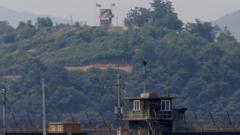Ahn Hak-sop, a 95-year-old former North Korean POW, made a heartfelt attempt to return to his homeland this week, hoping to be buried there. Despite turning back due to government restrictions, his journey reflects deep-rooted sentiments about identity, patriotism, and the divide between North and South Korea.
Ahn Hak-sop’s Final Journey: The 95-Year-Old POW Yearns for Home

Ahn Hak-sop’s Final Journey: The 95-Year-Old POW Yearns for Home
The poignant story of a Korean veteran's desire to return to the North after spending decades in the South.
On a sweltering morning earlier this week, a gathering of activists and police convened at Imjingang Station—the last point on Seoul’s subway that approaches North Korea—where Ahn Hak-sop, a 95-year-old former prisoner of war, sought to embark on what he termed his final journey home. Mr. Ahn, who wished to be buried in North Korea after a lifetime spent in the South, was ultimately denied entry, as expected due to the South Korean government's lack of arrangements for his passage.
His frailty was marked by pulmonary oedema, preventing him from completing the 30-minute trek to Tongil Dae-gyo, one of the few routes connecting the two Koreas. However, Ahn bravely walked the last 200 meters, displaying a North Korean flag—an unusual sight in the South—while addressing the supporters who came to witness his emotional moment. “I just want my body to rest in a truly independent land,” he articulated, highlighting his profound desire for a homeland free from perceived imperial rule.
Ahn’s story traces back to 1953, when, at just 23 years old, he was captured by the South Koreans while serving in the North Korean army during the Korean War. Following years of imprisonment and a struggle to adapt after his eventual release in 1995, Ahn faced many challenges in South Korea, where he was often regarded with suspicion due to his past affiliations. While many former prisoners chose to return to the North in the early 2000s, Ahn declined, believing that returning would equate to conceding his homeland to the Americans.
His belief that the U.S. continues to impose colonial rule over South Korea remains steadfast. Ahn grew up during Japanese rule, and with the end of World War II, he felt that the subsequent U.S. military presence simply represented a shift rather than true liberation. As he recounted his life experiences filled with resistance against forced ideological conformity even in South Korea's prisons, he remains steadfast in his commitment to advocating for a North that he feels has been unjustly depicted by external narratives.
With the North now under the rule of Kim Il-sung’s grandson and facing economic struggles while continuing to engage internationally, Ahn holds onto his ideals, dismissing criticisms of the North. He continues to protest what he perceives as ongoing American colonialism, ensuring that even in his twilight years, his voice remains a testament to his beliefs.
As South Korea transitions into a prosperous democracy, the divide between the North and South remains palpable, and figures like Ahn Hak-sop highlight the personal dimensions of this ongoing geopolitical conflict.
His frailty was marked by pulmonary oedema, preventing him from completing the 30-minute trek to Tongil Dae-gyo, one of the few routes connecting the two Koreas. However, Ahn bravely walked the last 200 meters, displaying a North Korean flag—an unusual sight in the South—while addressing the supporters who came to witness his emotional moment. “I just want my body to rest in a truly independent land,” he articulated, highlighting his profound desire for a homeland free from perceived imperial rule.
Ahn’s story traces back to 1953, when, at just 23 years old, he was captured by the South Koreans while serving in the North Korean army during the Korean War. Following years of imprisonment and a struggle to adapt after his eventual release in 1995, Ahn faced many challenges in South Korea, where he was often regarded with suspicion due to his past affiliations. While many former prisoners chose to return to the North in the early 2000s, Ahn declined, believing that returning would equate to conceding his homeland to the Americans.
His belief that the U.S. continues to impose colonial rule over South Korea remains steadfast. Ahn grew up during Japanese rule, and with the end of World War II, he felt that the subsequent U.S. military presence simply represented a shift rather than true liberation. As he recounted his life experiences filled with resistance against forced ideological conformity even in South Korea's prisons, he remains steadfast in his commitment to advocating for a North that he feels has been unjustly depicted by external narratives.
With the North now under the rule of Kim Il-sung’s grandson and facing economic struggles while continuing to engage internationally, Ahn holds onto his ideals, dismissing criticisms of the North. He continues to protest what he perceives as ongoing American colonialism, ensuring that even in his twilight years, his voice remains a testament to his beliefs.
As South Korea transitions into a prosperous democracy, the divide between the North and South remains palpable, and figures like Ahn Hak-sop highlight the personal dimensions of this ongoing geopolitical conflict.
















